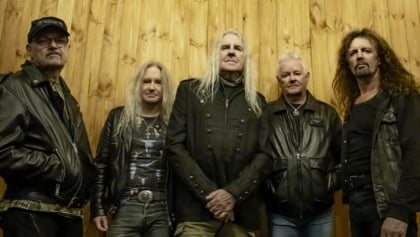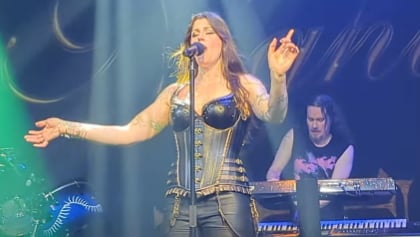
For actor Romola Garai, it all changed when she snagged her dream role in 2004’s Havana Nights, the sequel to ‘80s classic Dirty Dancing. Aged 17, she played lead Katey Miller in her first big blockbuster role. But the experience was so terrible that she left Hollywood soon after (as well as acting) and returned to university. In a 2017 interview, Garai described the production as “a cesspit of horrific misogyny.” She was weighed daily and assigned a dietician to ensure she remained underweight.
If this was what fame looked like, Garai didn’t want it. “It’s like so many actresses are just on a diet their whole lives,” she says, now 39 and Zooming in from her London home. “When I talk about my experience on that film, there are so many women I know and they’re really confused: ‘But that’s standard! Why weren’t you already on a diet? What were you doing eating all those potatoes?!’
“so many actresses are on a diet their whole lives”
“It’s all about your individual relationship with your body and what you’re comfortable with and for whatever reason, I don’t know whether it was my background, my personality or whatever, I knew I’d just never feel happy that way.”
Fast-forward to 2022 and, in the years since giving Tinseltown the middle finger, Garai has crafted a successful career while playing by her own rules. She went on to star in acclaimed films like Atonement and Suffragette – and racked up BAFTA and Golden Globe nominations for The Hour, Emma and The Crimson Petal and the White.

Now she’s just happy to be known as one of Britain’s most-trusted actors, while maintaining the beliefs of a passionate feminist with a fearlessness when it comes to speaking out for what’s right.
“I love food, it’s a huge part of life and I feel very comfortable in my body,” she says. “But I don’t like trading in my body and thinking about it as a commodity. It’s not the way that I feel happy. But there are many, many women who don’t mind, and don’t think about it as a rape of their liberty to have to weigh 120 pounds. It’s just taken as a fact of life: if you want to be a movie star, that’s what you have to weigh. I wasn’t up for that. I mean, I really love potatoes,” she says with a laugh.

Garai’s next move, unsurprisingly, is her boldest yet. Two decades into an established career, she has written and directed her first feature film – a feminist horror called Amulet. It takes aim at men who use their powers to abuse women. “I wrote the film around the time #MeToo began,” she says. “It is an act of karmic reckoning.”
Set in a “haunted” house, Amulet follows Tomaz, a former soldier with a dark past (God’s Own Country’s Alec Secareanu) who lodges with Magda (Blade Runner 2049’s Carla Juri) when they are introduced by local nun Sister Claire, played by Imelda Staunton. Tomaz suspects something is amiss, and ventures into the attic where he discovers an evil creature. What follows is a brilliantly surreal – and completely terrifying – exploration of the female experience at the hands of men via abuse of power and the male gaze.
Sadly, it feels like Amulet could also have been marked by another of Garai’s bad industry experiences. Aged 18, she was asked to go to Harvey Weinstein’s room at the Savoy Hotel, London, for an interview. The now-disgraced producer wore only a dressing gown. Garai later said she felt “violated” and that it was “an abuse of power.” She was one of the first to speak out publicly against Weinstein and his behaviour. In 2020, the former movie mogul was sentenced to 23 years in prison for the rape of multiple women. It was seen as a landmark moment for the #MeToo movement.
“I never want to shy away from the things that I believe in”
“I never, ever want to shy away from standing up for the things that I vehemently believe in,” Garai says of her decision to speak out at the time. “But now, I don’t think about it anymore… because I feel like sometimes it becomes the only thing about me. The incident itself was not something that was significant to me in my life. I think I feel angry about it and it’s symptomatic of a real problem in the industry, but what happened to me was not what happened to other people. It was important for me to [stand up] and say: ‘Yes, the guy was a pervert.’”
Following the verdict, does Garai think things have improved for women in film? “I think at the level I work at, and with the collaborators I have, people take it very seriously. I think the people that I work with… didn’t employ enough women [previously]. I wasn’t working, at any stage in my career, in a highly abusive environment, but I think there are parts of the industry where I don’t know whether it has really changed.
“I don’t know whether we’ll have a potential version of the future where there aren’t a lot of people who just think that actresses are prostitutes. That women who enter the industry do so trading on their looks then deserve what’s coming to them. It’s still a dirty game.”

Since speaking out, Garai has chosen to channel that anger into her work. Amulet was inspired by films like David Cronenberg’s The Fly, Guillermo Del Toro’s Pan’s Labyrinth and Jennifer Kent’s The Babadook. Horror, felt Garai, was a genre in which she could “take more risks.”
She says the creation of Tomaz is a good example of this. “For years as an actress, I was reading lots of scripts where there was a move to depict more sexual violence, specifically women’s experience of sexual violence on screen. But often, the male characters were still very othered. They’re freaks, they’re not part of normal society and that’s obviously not the case with many male sexual predators. It’s actually men who want to protect women, who revere and hold women up on a pedestal, that are sometimes the greatest threat to them. When women behave as they normally do, they destroy their perfect ideal and that is really threatening to some men. And those men can be ordinary men.”

Tomaz is one such man: he’s portrayed as an “ordinary, educated, nice boy” early on before he is revealed as a rapist. During a recent, unspecified European war, he attacked a woman and Garai reveals this via gradual clues.
“It’s very psychologically challenging for men to be told that their entire sexual behaviour, the entire basis of the way they relate to, see and think about women, is wrong,” Garai says. “Tomaz is offending Magda from the very beginning. His need to care for her is entirely about himself. His need to make her look vulnerable is so he can feel good.
“I hope some people feel angry watching ‘Amulet’”
“I hope some people feel angry watching the film. I hope people feel provoked and disgusted. I’m hoping for arguments on the way home after people see it.”
Horror is a genre where female filmmakers are flourishing right now. The aforementioned Jennifer Kent, Julia Ducournau (Titane) and Nia DaCosta (Candyman) are all in demand. What does Garai think it is about the genre that’s enabling women to thrive? “I think there is a boring, pragmatic answer,” she says, “which is that it’s just easier to get these kinds of films made at the moment when you’re a first-time filmmaker. People will go to the cinema to see them, so more people are willing to let you take risks.
“But there’s also a more subtle and interesting answer, which is that there were almost no women working in [the horror] space and that had become a massive embarrassment… I think there was a considered effort to correct that and as is always the case whenever people are like: ‘Why don’t we have any women?’ There were lots of women already there, and they were finally being given long overdue opportunities.”

While women may be getting more opportunities, there are still issues for many on set. Mothers, Garai says, are unfairly penalised by the system. She is a campaigner for Parents & Carers In Performing Arts, an organisation that fights working practices which discriminate against parents and carers in the workplace. “Filming is not compatible with family life,” she says. “It’s a very common thing for me to go to work and see women and men in tears all the time because they cannot see their children. It’s not right.”
It’s impressive hearing Garai speak with such conviction about the treatment of women in film. In an industry where they have been historically silenced, Garai is a powerful voice. She takes no nonsense when it comes to the ownership of her body, her mental well-being and her rights as a woman. Her fearlessness when it comes to speaking out for what’s right is both inspiring to watch, and of course much needed at a time when women are still struggling to be heard.
While she may have been daunted turning down “inappropriate” roles following her Havana Nights experience, that decision paid off: it led to the parts she’d always wanted to play, and films she always wanted to make. “By the end of my late twenties, I was doing work that I really loved and felt really proud of,” she says, before firing off a long list of projects she’s enjoyed – both in front of and behind the camera.
Indeed, Garai is happiest balancing out a career where she can write, act, and direct. It gives her a “slightly” better balance with family life – which is important, because she has a hell of a lot going on right now. There are several new jobs in the pipeline – more horror, sci-fi, period dramas and even some comedy. But, as you’d expect, big-budget blockbusters will not be on the agenda. “There are so many downsides to [those films],” she says. “I want to [do] unique and original and, hopefully, distinctive projects… I want to really invest in making pieces of work I feel really, really strongly about. That’s what matters to me most.”
Garai doesn’t want or need fame and is setting out an alternative path for women in the industry. You don’t have to be a passenger on your own journey. You can follow your own rules and still be successful. She’s the living proof.
‘Amulet’, Romola Garai’s directorial debut, is out in UK cinemas from January 28
The post Romola Garai on Hollywood after #MeToo: “Acting is still a dirty game” appeared first on NME.







